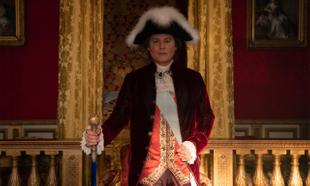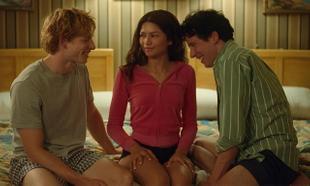The story of Lance Armstrong and his spectacular fall from grace is one that has been covered extensively in recent years. There isn't a person alive in the Western world who isn't familiar with Armstrong in some shape or form; whether it's through his well-documented doping scandal, his charities or his tactics in dealing with rogue journalists. So with that in mind, one would have to wonder why it took so long for The Program, the first feature narrative on the subject, to get made. Was it legal disputes? Was it the reframing of the story? Who knows.
Ben Foster is Lance Armstrong and picks up at the beginning of his career. He's unsuccessful, he's struggling to keep apace with other riders on the Tour De France and, most importantly, he's hungry to win. However, it's made abundantly clear that, for all his drive and ambition, Armstrong is physically incapable of succeeding in the sport. It's around this time to we're introduced to Chris O'Dowd's take on David Walsh. Like us, we're taken in by Armstrong's charms and his plucky attitude. That attitude, of course, belies a sort of naivete when he goes to meet Dr. Michele Ferrari, played by an almost-unrecognisable Guillaume Canet. It's here that the film literally gets a boost, as Ferrari rattles on about the importance of his work and how it pushes men into the realm of gods. If you're thinking that sounds like Bond villain dialogue, you're absolutely right because that's how he's played.
As Armstrong's success becomes more and more evident, Walsh naturally becomes suspicious. But it's here where the film's faults become clear. Instead of focusing on Walsh's investigation, we're simply treated to a sort-of highlights reel of Armstrong's career and actions. We're taken through a chronological, step-by-step recreation of how he did it, but never why he did it. The motivations aren't explored in any great detail beyond he wanted to win and that's it. We don't see any explanation for his bullying tactics, again beyond they were in his way and threatened him. Was Armstrong really that simple? Were his motivations that straightforward? Definitely not. There was very obviously something rooted very deep within him that made him so duplicitous - yet it's never investigated.That's what makes The Program so frustrating to watch. We're hoping to see some sort of analysis or examination as to why he did it, or indeed, how Walsh discovered the doping and brought it to life. Instead, we get one or two scenes with Walsh arguing with his editor and that's it. We also see a scene where he's blockaded by his fellow journalists because Armstrong's blocking access. Again, it's superficial - one scene and then it's on to the next one.
Foster gives a very physical performance, transforming himself completely for the role and capturing that dead-eyed smile completely. However, his performance can't elevate a lacklustre script and heavy-handed directing by Stephen Frears. Chris O'Dowd doesn't really do much as David Walsh, other than turn up at key moments and remind us that, yes, Armstrong's a bad guy and he's up to no good. We see none of the brilliant investigative work or how he exposed the scandal of doping in professional cycling beyond a scene here and there. The Program was billed as a sort of All The President's Men of sports journalism, but instead it comes off like a recreation within a documentary. It's a shame because the story is fascinating and, although it has been covered more closely in documentaries, there was a ripe opportunity here to show us what Armstrong was like behind closed doors. Instead, The Program's too caught up in trying to blast through the story than let us sit and and examine it. Stephen Frears, who skilfully directed The Queen and Philomena, should have been better than this. It's entirely possible that Armstrong's considerable legal arsenal ham-strung some of the creative decisions; it certainly would explain why this was so disappointing.










































































